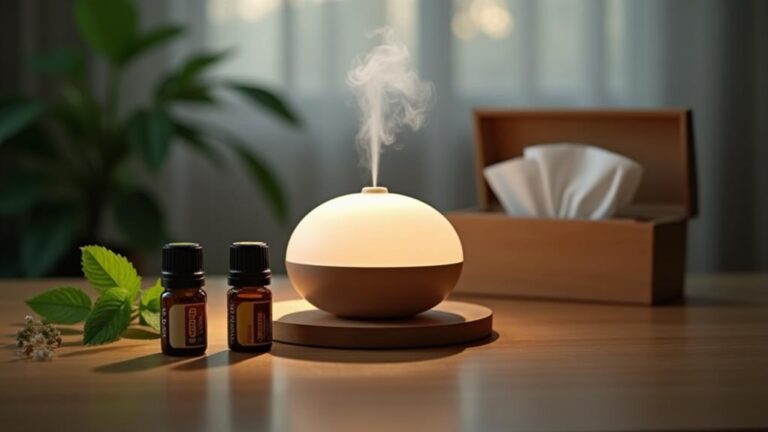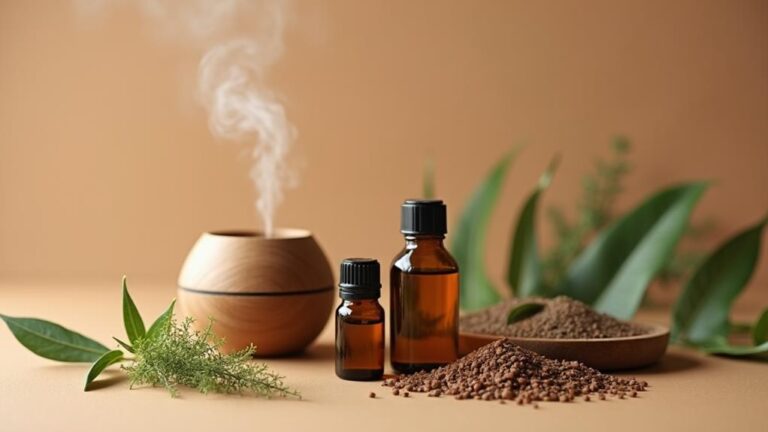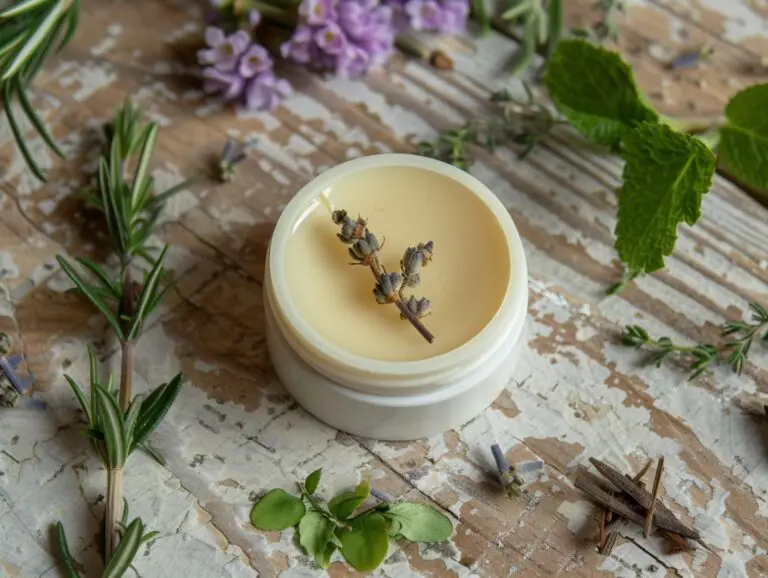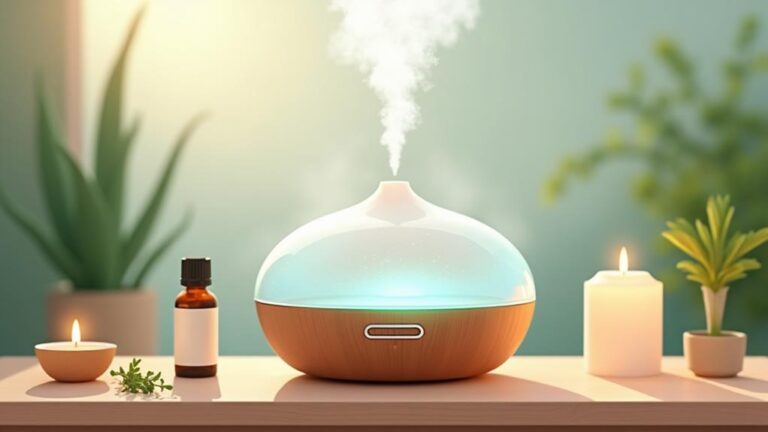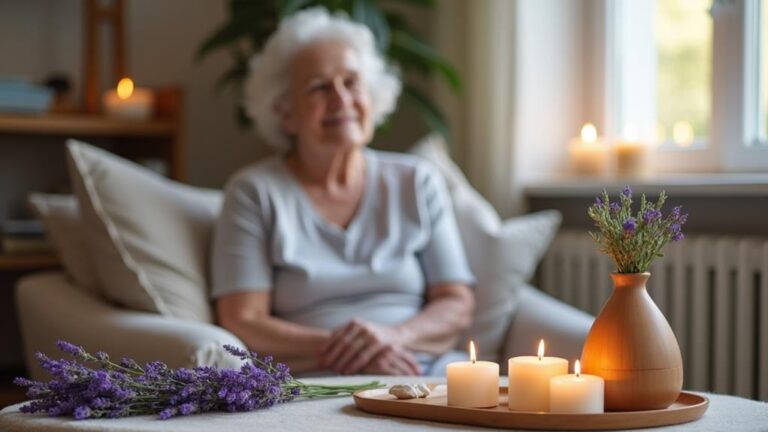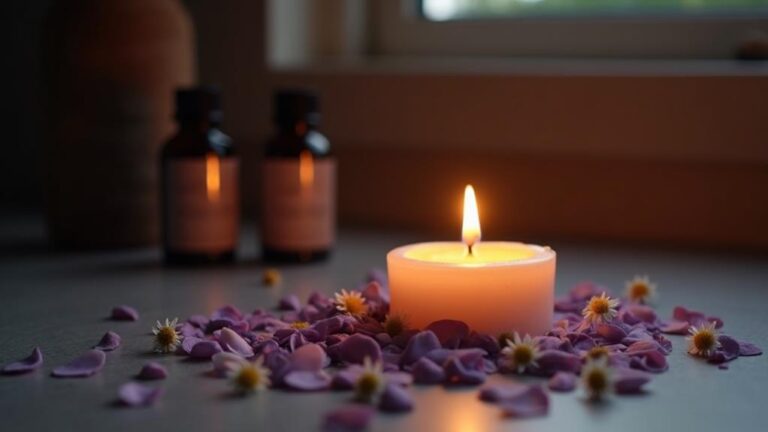As you're browsing through a cancer support group's online forum, you coincidentally stumble upon a thread discussing the benefits of aromatherapy during treatment – a topic that's been on your mind since a friend recently recommended it to you. You've heard claims that essential oils can alleviate chemotherapy-induced nausea and pain, but you're not sure what to make of it. Can something as simple as a pleasant scent really make a difference in cancer patients' lives? The more you think about it, the more you're intrigued by the possibility that aromatherapy might be more than just a nice-to-have; it could be a game-changer.
Key Takeaways
- Aromatherapy reduces anxiety and stress levels, promoting emotional well-being and relaxation in cancer patients.
- Regular aromatherapy sessions can help manage emotional turmoil, promoting emotional healing and improving overall quality of life.
- Certain essential oils have natural analgesic and anti-inflammatory properties, providing relief from chronic pain and skin care issues.
- Aromatherapy can alleviate chemotherapy fatigue, nausea, and insomnia, common side effects of cancer treatment.
- By promoting relaxation and reducing anxiety, aromatherapy improves sleep quality, increases energy, and enhances mood in cancer patients.
Aromatherapy in Cancer Care Settings
In cancer care settings, healthcare teams are recognizing the benefits of incorporating aromatherapy into their treatment plans.
As a patient, you may be wondering how this complementary therapy can support your care. Aromatherapy can provide a holistic approach to managing symptoms and improving overall well-being.
To effectively integrate aromatherapy into cancer care, healthcare professionals undergo specialized aromatherapy training.
This training enables them to understand the safe and effective use of essential oils, blending techniques, and contraindications.
Additionally, healthcare facilities invest in aromatherapy equipment, such as diffusers and inhalers, to deliver high-quality aromatherapy sessions.
You may encounter aromatherapy in various forms, including individual or group sessions, bedside therapy, or even self-administered aromatherapy through guided tutorials.
Reducing Anxiety and Stress Levels
As you navigate the challenges of cancer treatment, you're likely no stranger to anxiety and stress.
Fortunately, aromatherapy can offer a natural respite from these feelings, and certain calming essential oils can help soothe your mind and body.
Calming Essential Oils
Managing anxiety and stress is crucial for cancer patients, as heightened emotions can exacerbate symptoms and impede healing. As you navigate this challenging time, incorporating calming essential oils into your routine can be a valuable coping mechanism. These oils have a profound impact on your emotional well-being, promoting relaxation and reducing feelings of anxiety.
Some of the most effective calming essential oils for cancer patients include:
| Essential Oil | Therapeutic Profile | Essential Blending Methods |
|---|---|---|
| Lavender | Promotes relaxation, reduces anxiety | Blend with chamomile for enhanced calming effects |
| Bergamot | Reduces stress and anxiety, uplifts mood | Combine with ylang-ylang for a soothing blend |
| Frankincense | Reduces anxiety and stress, promotes relaxation | Use in a diffuser or topical application for best results |
When using these oils, a crucial step is to consult with a healthcare professional to determine the best method of application for your individual needs. By incorporating these calming essential oils into your daily routine, you can better manage anxiety and stress, promoting a more peaceful and relaxing experience during your cancer journey.
Relaxation Techniques
You've taken the first step towards calming your mind and body with the help of essential oils. Now, let's explore relaxation techniques that can further reduce anxiety and stress levels.
Meditation is an excellent way to quiet your mind and promote relaxation. By incorporating meditation into your daily routine, you can experience benefits such as improved sleep quality, increased energy, and enhanced mood.
Start with short sessions, even just 5-10 minutes a day, and focus on your breath. As you inhale and exhale, allow your thoughts to pass without judgment, and simply be present in the moment.
Breath control techniques are another effective way to calm your nervous system. Try inhaling deeply through your nose, holding your breath for a few seconds, and exhaling slowly through your mouth. This simple exercise can help slow down your heart rate and promote relaxation.
Essential Oils for Nausea Relief
[TEXT]:
You're likely no stranger to the debilitating effects of nausea, a common side effect of cancer treatment.
Fortunately, aromatherapy offers a natural way to find relief, with essential oil blends specifically designed to soothe your stomach and calm your senses.
Essential Oil Blends
Essential oil blends can be a powerful tool in your arsenal against nausea, a debilitating side effect of cancer treatment that can profoundly impact your quality of life.
By combining specific essential oils, you can create a customized blend that targets your unique needs and preferences.
When selecting essential oils for nausea relief, it's vital to think about essential oil preservation methods, as this can affect the oil's potency and efficacy. Look for oils that are extracted using high-quality methods and stored properly to maintain their therapeutic properties.
Aromatic fragrance profiling is another important consideration when creating an essential oil blend.
Certain fragrances can be more effective at alleviating nausea than others, so it's vital to choose oils that resonate with your personal preferences. For example, peppermint and ginger oils are commonly used in nausea-relief blends due to their calming and grounding properties.
Natural Relief Options
As you explore the world of aromatherapy for nausea relief, it's natural to wonder which essential oils can provide the most effective natural relief options.
You're likely looking for alternatives or complements to traditional medications, and aromatherapy can be a great addition to your toolkit.
Some essential oils have been shown to have a positive impact on nausea relief. These include:
- Peppermint oil, which can help alleviate nausea and vomiting
- Ginger oil, which has natural anti-inflammatory properties
- Lavender oil, which can promote relaxation and reduce anxiety
- Bergamot oil, which has been shown to reduce anxiety and stress
- Frankincense oil, which can help reduce inflammation and pain
In addition to using these essential oils, you may also find it helpful to incorporate other natural relief options into your routine.
Drinking herbal teas, such as ginger or peppermint, can be soothing and calming.
Practicing mindful breathing exercises can also help reduce anxiety and promote relaxation.
Managing Pain With Aromatherapy
Some essential oils have natural analgesic and anti-inflammatory properties, which can help alleviate pain. Here is a breakdown of some commonly used oils and their benefits:
| Essential Oil | Pain-Relieving Properties | Method of Use |
|---|---|---|
| Lavender | Analgesic, anti-inflammatory | Topical application, inhalation |
| Peppermint | Cooling, numbing | Topical application, inhalation |
| Frankincense | Anti-inflammatory, pain relief | Topical application, inhalation |
| Ginger | Anti-inflammatory, pain relief | Topical application, ingestion |
| Clary Sage | Analgesic, relaxation | Topical application, inhalation |
Improving Sleep Quality Naturally
During cancer treatment, nearly 70% of patients experience sleep disturbances, which can exacerbate fatigue, anxiety, and depression. Aromatherapy can help you improve your sleep quality naturally.
You may be struggling with sleep disorders, but incorporating aromatherapy into your morning routine can make a significant difference.
Here's how:
- Start your day by inhaling the calming scent of lavender essential oil, which promotes relaxation and reduces anxiety.
- Use a diffuser with a soothing blend of bergamot and ylang-ylang essential oils to create a peaceful atmosphere.
- Apply a gentle, calming massage oil infused with chamomile essential oil to your skin before bed.
- Create a sleep-conducive environment by using a calming essential oil spray on your pillow or bedding.
- Try incorporating a relaxing bath with Epsom salt and a few drops of clary sage essential oil into your bedtime routine.
Boosting Mood and Emotional Well-being
You've made it through the challenges of sleep disturbances, and now it's time to tackle another common issue many cancer patients face: emotional turmoil. Aromatherapy can play a crucial role in boosting your mood and emotional well-being during this difficult time. Certain essential oils, such as bergamot, lavender, and ylang-ylang, have been shown to reduce anxiety and stress levels, promoting a sense of calm and relaxation.
In addition to the physical benefits, aromatherapy can also foster emotional releases, helping you process and cope with the emotional rollercoaster that often accompanies cancer treatment.
By incorporating aromatherapy into your daily routine, you may find that you're better equipped to manage your emotions, reducing feelings of sadness, frustration, and fear. Furthermore, aromatherapy can help you reconnect with social connections, which are essential for emotional support and healing.
Aromatherapy for Skin Care Issues
Cancer treatment's harsh chemicals and radiation can leave your skin dry, itchy, and irritated, making it difficult to feel confident and comfortable in your own body. Aromatherapy can provide some much-needed relief from these skin care issues.
Some essential oils have antibacterial and anti-inflammatory properties, making them perfect for:
- Reducing acne and promoting healthy skin
- Soothing itchy skin and reducing inflammation
- Accelerating wound healing by promoting tissue regeneration
- Hydrating dry skin and locking in moisture
- Reducing scarring and promoting skin elasticity
Incorporating aromatherapy into your skincare routine can be as simple as adding a few drops of essential oil to your moisturizer or using a diffuser to inhale the benefits.
Certain oils like tea tree oil, lavender oil, and geranium oil have been shown to have a positive impact on skin health.
Side Effects of Chemotherapy Relief
Tackling the debilitating side effects of chemotherapy can be an intimidating task, but aromatherapy offers a beacon of hope.
As you navigate the challenges of chemotherapy, you're likely no stranger to the exhaustion that comes with it. Chemotherapy fatigue is a common complaint, leaving you feeling drained and depleted.
Aromatherapy can help alleviate this fatigue, promoting relaxation and reducing anxiety. Certain essential oils, such as peppermint and eucalyptus, have been shown to increase energy levels and improve overall well-being.
Another distressing side effect of chemotherapy is hair loss. Losing your hair can be emotionally taxing, affecting your self-confidence and sense of identity.
Aromatherapy may offer a solution here too. Some studies suggest that certain essential oils, such as lavender and rosemary, can help prevent hair loss or even promote hair growth.
While more research is needed, the results are promising. By incorporating aromatherapy into your care routine, you may find relief from these distressing side effects, allowing you to focus on your healing journey.
The Science Behind Aromatherapy Benefits
[TEXT]:
Hope emerges on the horizon as researchers unravel the mysteries of aromatherapy's benefits, illuminating the intricate dance between scent, brain, and body.
As you explore the science behind aromatherapy, you'll discover a complex interplay of molecular interactions that influence your brain function and overall well-being.
- Aromatherapy triggers the release of neurotransmitters, such as serotonin and dopamine, which regulate mood, pain, and emotional responses.
- Essential oils interact with the brain's limbic system, which processes emotions, memories, and sensations.
- The olfactory system, responsible for processing scents, is closely linked to the brain's emotional centers, explaining why aromas can evoke strong emotional responses.
- Aromatherapy can alter brain wave activity, promoting relaxation and reducing anxiety.
- The molecular structure of essential oils allows them to penetrate the blood-brain barrier, enabling direct interaction with brain cells and influencing brain function.
Frequently Asked Questions
Can Aromatherapy Replace Traditional Cancer Treatment?
You're wondering if aromatherapy can replace traditional cancer treatment; while it's a valuable holistic approach, it shouldn't be relied on as a standalone cure. Instead, consider it an alternative therapy to complement your treatment, enhancing your overall well-being and reducing symptoms.
Are Essential Oils Safe for Pediatric Cancer Patients?
When considering essential oils for your child's cancer treatment, you're right to worry about safety. As a parent, you want to guarantee their developing body can handle these potent oils, addressing your concerns about child development and alleviating parental fears.
How Long Does Aromatherapy Take to Show Results?
As you navigate the calming domain of aromatherapy, you're likely wondering how long it takes to reap the benefits. The answer lies in consistency: regular therapy sessions, ideally 2-3 times a week, can show noticeable results within 4-6 weeks, but individual responses may vary.
Can Aromatherapy Help With Hair Loss During Chemotherapy?
You're wondering if aromatherapy can help with hair loss during chemotherapy. The good news is that scalp massage with herbal remedies like lavender and rosemary may stimulate hair growth and reduce shedding, promoting a sense of comfort and confidence.
Are Aromatherapy Sessions Typically Covered by Health Insurance?
When seeking aromatherapy, you'll likely need to check your insurance policies, as coverage varies; be prepared for out-of-pocket expenses, but don't hesitate to ask about costs upfront to plan your budget and prioritize your well-being.
Conclusion
As you navigate the challenges of cancer treatment, aromatherapy can be a beacon of hope, offering a sense of calm in the storm. By incorporating this natural therapy into your care plan, you can ease anxiety, manage pain, and find solace in a restful night's sleep. Like a gentle breeze on a summer's day, aromatherapy can soothe your mind, body, and spirit, helping you find strength in the darkest of times.



